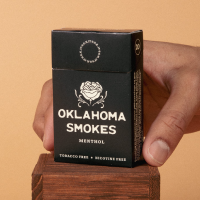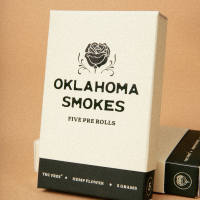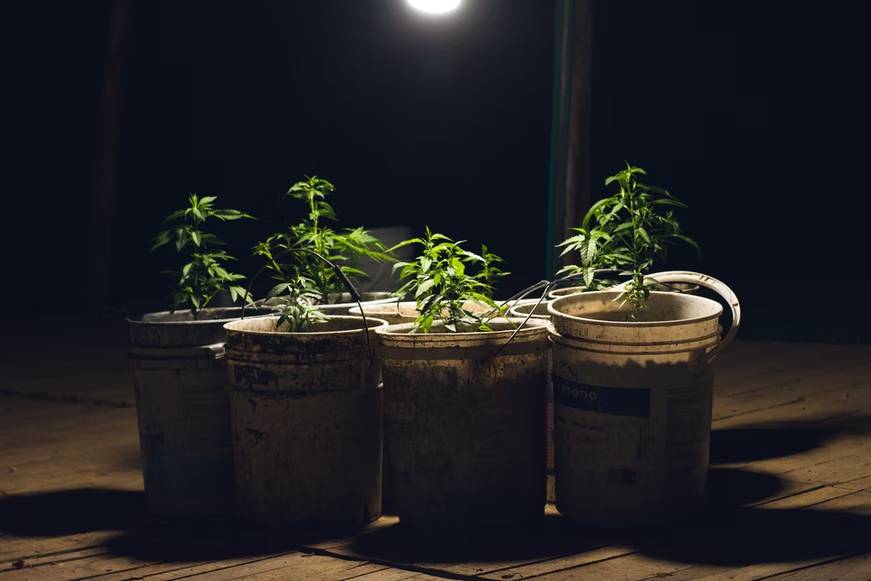More than 480 natural components are found in cannabis, including over 100 cannabinoids and about 400 terpenes. Cannabinoids are known chemical compounds acting on the cell's cannabinoid receptors to alter neurotransmitter release in the brain. Among the most researched of these compounds are THC (delta-9 tetrahydrocannabinol) and CBD (cannabidiol).
THC and CBD are two very common and popular cannabinoids found in the cannabis plant. The two compounds have a lot of similar properties but also some crucial differences. Still, both can be used to treat medical conditions—they’re just different in how they do it.
The main difference between THC and CBD is their effect on the brain. When you consume either cannabinoid, your body breaks them down into smaller molecules that interact with receptors throughout your central nervous system (CNS). These receptors can affect body systems, altering anything from heart rate to pain sensitivity.
To make things even more confusing, people often use CBD and THC interchangeably to describe products containing either or both compounds. It's not just a matter of semantics, though. There are fundamental differences between these two, and we'll be explaining them in this post.
What Is CBD?
Cannabidiol, or CBD, is one of over 100 cannabinoids that exist naturally in both plants and human beings and is the second most common compound in cannabis.
CBD was discovered in the 1940s, but it only gained popularity recently after researchers reported it to cure many conditions. It can be derived from either hemp or marijuana, though marijuana-derived CBD contains greater amounts of THC than its counterpart.
Unlike THC, CBD is not psychoactive—meaning you won’t feel high when you consume it—and it causes little to no withdrawal symptoms if you stop using it. CBD also shows several potential health benefits, like the following:
- Pain management—Research indicates that CBD may be able to help people manage pain resulting from inflammation and other sources.
- Inflammation reduction—Studies suggest that CBD may play a role in reducing inflammation throughout the body.
- Mental health—CBD shows considerable potential as a treatment for multiple anxiety disorders and depression symptoms.
If you want to quit smoking tobacco but are still on the fence about whether you can do it, check out Oklahoma Smokes’s CBD cigarettes. With this, you still get the feel of smoking cigarettes, but you can get the addiction out of the equation.
What Is THC?
THC—short for tetrahydrocannabinol—is the primary psychoactive component of marijuana. Like CBD, it is also a naturally occurring cannabinoid.
This compound interacts with specific receptors in your body which make up what’s known as the endocannabinoid system (ECS). When THC binds to these body receptors, they can easily regulate things like appetite and anxiety levels.
The cannabinoid specifically acts on both CB1 and CB2 receptors. While the former is found in your brain, the latter is found throughout the body. This interplay between these types of receptors sets it apart from CBD and causes the mind-altering effects many people associate with consuming THC-containing cannabis products.
THC, which is often administered as medical marijuana, can alleviate symptoms of various conditions. The following are only a few of them:
- Chemotherapy-related sickness—Researchers suggest THC can help those dealing with nausea and poor appetite resulting from cancer treatments.
- Tremors—A study indicates that this cannabinoid appears to benefit patients enduring tremor-associated diseases.
Pain management—Like CBD, THC is able to help people better manage their pain.

Key Differences Between CBD and THC
CBD and THC differ mainly in that the former is not psychoactive, while the latter is. This means that CBD won’t get you high when you consume it.
In contrast, THC binds to specific receptors on brain cells called cannabinoid receptors CB1 and CB2. Activating them induces euphoria and may cause you to feel side effects like anxiety. However, unlike THC—which can also cause short-term memory loss due to its psychoactive effects—CBD doesn't affect your memory.
Further below, we’ll go over the key differences between these two cannabinoids.
Chemical structure
CBD and THC have similar chemical formulas and are called “phytocannabinoids,” meaning they are naturally-occurring cannabinoids in plants like hemp or marijuana. They are also considered “endocannabinoids,” which occur naturally within the human body.
Although both have almost indistinguishable molecular structures, there are slight differences in how they are arranged, which causes the different effects they have.
They also share a similar chemical structure with other cannabinoids like CBG (cannabigerol) and CBC (cannabichromene). However, CBD and THC differ from these in that they have an acidic group at one end of their molecule, known as the carboxylic acid group.
This is responsible for their distinctive taste and smell when eaten raw, resulting from the substances’ interactions with your tongue's taste receptors. When you ingest them, these chemicals interact with receptors throughout your body to produce different reactions depending on their binding location.
For example, if you ingest CBD through edible hemp oil-containing products, such as CBD gummies, it will bind primarily with the CB1 receptors in your digestive system and cause nausea. However, if taken via an inhalation method such as vaping, it will bind primarily with CB2 receptors located throughout your nervous system.
Psychoactive components
CBD won’t get you high or induce euphoria, but it may help ease feelings of anxiety and improve your sleep quality. Because of its non-psychoactive properties and lack of abuse potential, CBD is legal in all 50 US states.
On the other hand, THC is a Schedule I controlled substance. Although hemp contains trace amounts of THC (less than 0.3%), it remains illegal under federal law in the United States and other countries where authorities regulate cannabis as a controlled substance.
While the CBD found in marijuana plants can interact with our endocannabinoid system (ECS), it doesn't bind directly to CB1 or CB2 receptors, unlike THC. Instead, CBD functions as an indirect antagonist of these receptors and inhibits their activity by reducing neurotransmitter release or reuptake. This is why CBD typically does not have psychoactive effects—it doesn't bind directly enough to either receptor to cause intoxication or impairment.
The bottom line is that while CBD and THC are both alike and found in marijuana, they have different effects on your body and mind when used separately or together in a product like CBD oil.
Legality
Both hemp oils and marijuana oils contain CBD, THC, and other cannabinoids and can be used for health purposes. They are also available as supplements worldwide, including in Europe and South America (where they're even sold over-the-counter). However, there is a legal difference between hemp-derived and marijuana-derived cannabinoids.
THC is illegal in several states, as it is classified as a Schedule I drug at the federal level. Still, most states have passed laws legalizing medical marijuana and the recreational use of cannabis products with THC.
CBD's legality differs from state to state as well—although it's typically much less contentious than its counterpart THC. In most cases, you can purchase hemp-derived CBD oil online or at your local health food store without worry that you'll be breaking any law. Then again, some companies are still concerned about federal regulations.
Potential Benefits
THC binds more strongly to CB1 receptors than CBD does. This means consuming high amounts of THC may lead to anxiety and paranoia. On the other hand, CBD blocks some of the effects of smoking or eating marijuana—like getting high—even though it binds with the same receptors as THC.
This can benefit people who want to use cannabis for medical purposes but don't want these side effects associated with traditional consumption methods.
Although you can enjoy the benefits of CBD without smoking it, the potential health benefits of THC are not as well-studied. Still, some have shown that THC may provide pain relief, reduce inflammation, and combat nausea and vomiting caused by chemotherapy. It's also improved sleep quality in people with epilepsy and multiple sclerosis (MS).
There's been limited research into whether or not THC can help with anxiety or depression. Moreover, there is some concern that people who use too much cannabis could experience psychosis or schizophrenia-like symptoms due to consuming high doses of CBD.
Pro Tip
|

CBD vs. THC: Which One Should You Take?
The product you choose will depend on what you are trying to achieve. While THC may be a better choice if you suffer from tremors or poor appetite—or simply want to feel its psychoactive effects—CBD provides impressive health benefits without the side effects its counterpart usually carries.
Interestingly, some studies even suggest the potential therapeutic effects of both are greater when taken together. Still, we believe you’ll be better off choosing a CBD product over a THC-based one for multiple reasons. Here’s what you need to know.
CBD is Legal in Most States
The 2018 Farm Bill made CBD-derived products legal in a number of states. On the other hand, THC can be illegal and federally unlawful in some states. If you don't want to break any law while also getting great results from your CBD product, we believe it’s best to look for a non-psychoactive strain.
In addition, opting for CBD might be helpful if you're trying to move past an addiction or dependency that centers around psychoactive substances such as alcohol or opioids (heroin).
CBD Helps You Enjoy the Health Benefits Minus the High
The main difference between CBD and THC is that the former does not have psychoactive effects. While consuming it will not make you feel high, you’ll still enjoy numerous health benefits.
Conversely, the chemical structure of THC makes it psychoactive, meaning the substance can affect your brain and change how you think and behave. This can cause short-term memory loss, drowsiness, and paranoia when consumed in large amounts, not to mention it can also become addictive should you take it regularly for an extended period.
CBD May Be More Beneficial for Autoimmune Conditions and Headaches
CBD and THC help with inflammation, but research suggests that CBD may be more beneficial for autoimmune diseases and headaches. However, keep in mind that most of the research surrounding CBD and immunosuppression was done on animals. Further research on humans is still needed.
Fortunately, research into CBD for autoimmune disease treatment is ongoing and showing promise that it could help with multiple sclerosis and rheumatoid arthritis.
CBD has Anti-Inflammatory Properties
CBD is an anti-inflammatory and anti-anxiety compound that can help with pain management. The cannabinoid blocks certain enzymes that trigger inflammation in the body and interacts with CB1 receptors located in the brain’s amygdala which regulate anxiety levels.
Still, formal studies on efficacy and dose needed are in great demand, and there’s not enough research around to make these statements conclusive.
CBD can Prevent Certain Types of Seizures
CBD has positive effects on epileptic seizures in both humans and animals.
Epileptic seizures result from abnormal electrical activity in the brain, leading to changes in behavior and movement. Because CBD reduces this abnormal electrical activity, it can also help prevent epileptic seizures.
If you want to know about alternatives to the addictive THC-enriched products, check out Oklahoma Smokes’s blogs and guides for fact-per-fact answers.
Visit Oklahoma Smokes and Check Out Our Pure Hemp CBD Cigarettes
If you’re looking for pure, high-quality hemp CBD cigarettes, visit Oklahoma Smokes. We value our clients’ trust and safety by ensuring that every batch we produce undergoes stringent double lab tests. You can even access our lab test certifications on our page to see that all the batches we produce are additive and pesticide-free.
We also have insightful blogs and guides in case you want to learn more about hemp and its derivatives. We make sure that every client's purchase is an informed choice. Whether it’s your first or tenth time trying us out, we promise to deliver only the best quality products and services.
If you have inquiries or are ready to make a purchase, give us a call at (973)314-9105, send an email at howdy@itsoklahomas.com, or drop us a DM on our Facebook and Instagram pages. We’re at your beck and call.
Looking for tobacco alternatives? Visit Oklahoma Smokes to enjoy the benefits of CBD cigarettes without the side effects of tobacco and nicotine.
FAQs on CBD vs. THC: What’s the Difference?
1. Is CBD stronger than THC?
CBD is not as potent as THC. Also, while it may be more concentrated, it does not have the same psychoactive effects as its counterpart. Still, CBD has more than enough therapeutic properties for you to consider.
2. Which is better for pain? CBD or THC?
Both CBD and THC have been shown to relieve pain. However, research has found that THC may be more effective than CBD at reducing chronic pain.
3. Is THC safer to use than CBD?
No, THC is not safer to use than CBD. CBD is a non-intoxicating substance that has many positive health benefits. These include reducing anxiety, promoting relaxation, and improving sleep quality. CBD is also devoid of psychoactive effects—which means that it won't make you feel intoxicated or impaired.
If you're looking for a substance that will make you feel relaxed, focused, and clear-headed, there's no reason to choose THC over CBD, as THC can produce adverse side effects when consumed in large doses.




